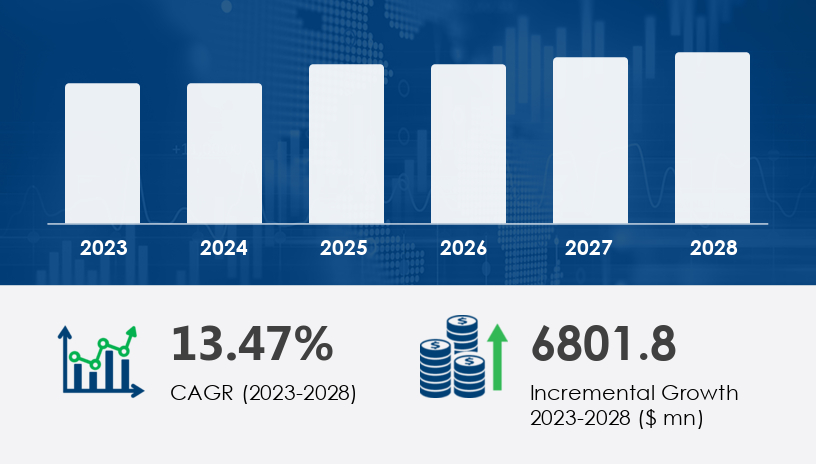Nerve Repair and Regeneration Market Size 2024-2028
The nerve repair and regeneration market is forecasted to grow by USD 6.8 billion at a CAGR of 13.47% between 2023 and 2028. The increasing prevalence of neurological disorders, heightened government investments in research, and the expansion of neurology-related research projects are fueling this growth. Advancements in technology, innovations in treatments, and evolving consumer preferences are also critical drivers. The market is evolving as the healthcare industry strives for more efficient systems, greater accessibility, and higher industry standards. Companies are focusing on sustainability and operational efficiency to stay competitive, ensuring long-term market growth. With rising demand for advanced nerve repair solutions, the market's scope is expanding to provide effective treatments for various neurological conditions, improving patient outcomes.

For more details about the industry, get the PDF sample report for free
Nerve Repair and Regeneration Market Segmentation
Product Segments
- Neuromodulation devices
- Biomaterials
Application Segments
- Neurorrhaphy
- Nerve grafting
- Stem cell therapy
Geography
- North America
- Europe
- Asia
- Rest of World (ROW)
The neuromodulation devices segment is anticipated to witness significant growth due to technological advancements in nerve stimulation for neurological disorders like Parkinson's disease, Alzheimer's, and epilepsy. Neuromodulation devices include internal and external types, such as spinal cord stimulation, deep brain stimulation, and transcutaneous electrical nerve stimulation.
Market Dynamics - Drivers, Trends, and Challenges
Drivers:
- Rising Prevalence of Neurological Disorders: Neurological disorders, such as Parkinson’s and Alzheimer’s disease, are prevalent across the globe, significantly impacting the population. Aging populations and environmental influences further exacerbate these conditions, increasing market demand for nerve repair and regeneration solutions.
- Technological Advancements: Innovations like processed nerve allografts, neurostimulation devices, nerve conduits, and stem cell therapies are transforming treatment approaches for neurological disorders.
- Surgical Procedures: Advances in surgical procedures, such as nerve grafting, are contributing to the market’s growth, offering effective solutions for peripheral nerve injuries.
Trends:
- Technological Advancements in Regenerative Medicine: Developments in neuromodulation, nerve wraps, electrical stimulation, and stem cell therapies are critical in nerve repair and regeneration. The use of biomaterials and 3D printing techniques also plays an essential role in driving growth.
- Increased Government Support: Government funding for research in neurology is accelerating, supporting the development of innovative treatment solutions and clinical trials.
Get more details by ordering the complete report
Challenges:
- Tissue Morbidity and Medical Device Recalls: Complications in nerve grafting and medical device recalls pose risks to market development.
- Regulatory and Clinical Trial Challenges: The complex regulatory landscape for medical devices and the slow pace of clinical trials for neurological treatments present obstacles.
- Shortage of Skilled Professionals: The dearth of trained specialists in neurology and nerve repair therapies limits the market’s growth potential.
Key Players in the Nerve Repair and Regeneration Market
- Abbott Laboratories
- ALEVA NEUROTHERAPEUTICS SA
- AxoGen Inc
- Baxter International Inc.
- BioWave Ltd.
- Boston Scientific Corp.
- Check Point Surgical Inc.
- Collagen Matrix Inc.
- Gimer Medical Co. Ltd.
- Integra Lifesciences Corp.
- KeriMedical SA
- LivaNova PLC
- Medtronic Plc
- NEURONETICS Inc.
- NeuroPace Inc.
- NeuroSigma Inc.
- Polyganics BV
- Soterix Medical Inc.
- Stryker Corp.
- Synapse Biomedical Inc.
Future Market Insights
The nerve repair and regeneration market is expected to experience continued growth, driven by increasing neurological disorder prevalence, technological advancements, and an aging population. Ongoing innovations in neuromodulation, stem cell therapies, and surgical techniques will expand treatment possibilities and improve patient outcomes. Although challenges such as tissue morbidity and medical device recalls remain, the market’s future looks promising with sustained government investment and research into innovative solutions.